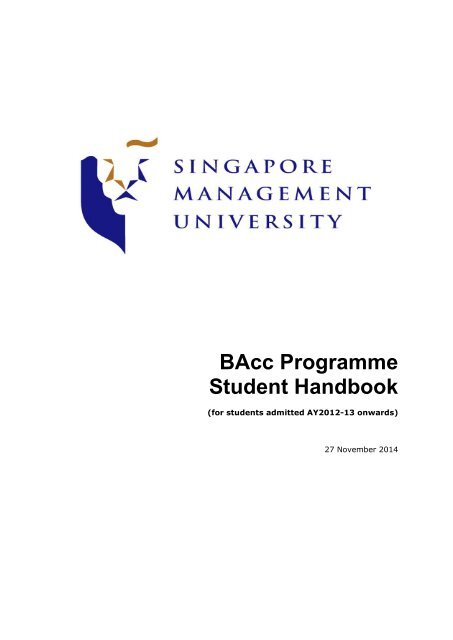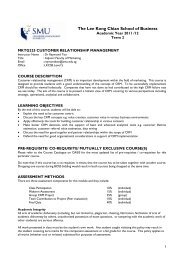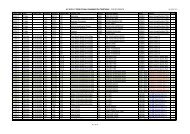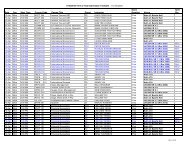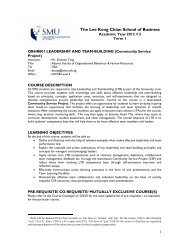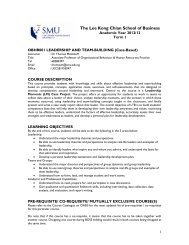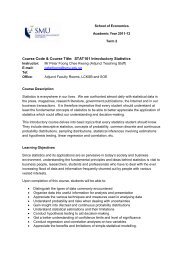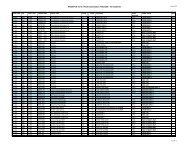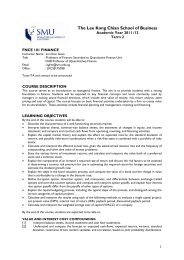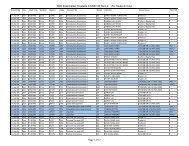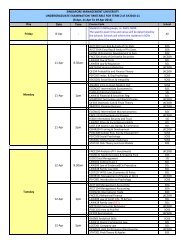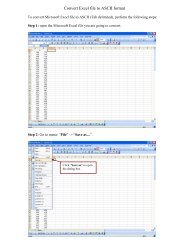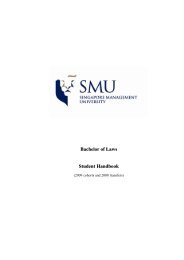BAcc Handbook - Singapore Management University
BAcc Handbook - Singapore Management University
BAcc Handbook - Singapore Management University
Create successful ePaper yourself
Turn your PDF publications into a flip-book with our unique Google optimized e-Paper software.
<strong>BAcc</strong> Programme<br />
Student <strong>Handbook</strong><br />
(for students admitted AY2012-13 onwards)<br />
27 November 2014
Table of Contents<br />
Overview.............................................................................................................. 1<br />
<strong>BAcc</strong> Curriculum .................................................................................................... 2<br />
Second Major........................................................................................................ 6<br />
Double Degree Programme ..................................................................................... 8<br />
Transfer of Programme ........................................................................................ 10<br />
Finishing Touch Programme ……………………………………………………………………………………………. 10<br />
Internship and Community Service Attachment Programme ..................................... 11
Overview<br />
The SMU School of Accountancy (School) undergraduate curriculum leads to the award<br />
of the degree of Bachelor of Accountancy (<strong>BAcc</strong>). The programme aims to produce<br />
professional accountants who possess the attributes and skills that are needed to thrive<br />
in a knowledge-based economy.<br />
Such attributes include analytical and creative abilities, a broad perspective to think<br />
across disciplines and geographical or political boundaries, and a confident mastery of<br />
today’s technology. The <strong>BAcc</strong> degree is listed as one of the degrees recognised for<br />
registration as a public accountant in <strong>Singapore</strong> under the <strong>Singapore</strong> Accountants’ Act.<br />
The <strong>BAcc</strong> programme is also accredited by the Institute of <strong>Singapore</strong> Chartered<br />
Accountants (ISCA) formerly known as the Institute of Certified Public Accountants of<br />
<strong>Singapore</strong> (ICPAS), Accounting and Corporate Regulatory Authority (ACRA), CPA<br />
Australia, Institute of Chartered Accountants In Australia (ICAA), the Institute of<br />
Chartered Accountants in England and Wales (ICAEW), Chartered Institute of<br />
<strong>Management</strong> Accountants (CIMA) and AACSB International (AACSB). These professional<br />
accountancy accreditations mean our graduates have satisfied the entry requirements<br />
for membership in the professional bodies.<br />
At the same time, it offers a broad-based and liberal education so as to provide the<br />
student with a broader perspective of the work environment and the world at large. In<br />
order to accomplish this objective, the curriculum is structured as below:<br />
Course Units<br />
Foundation Courses 3 units Year 1 only<br />
<strong>University</strong> Core 6 units Year 1 to 3<br />
Business Subjects 8 units Year 1 to 2 a<br />
Accounting Core 9 units Year 2 to 4<br />
Accounting Options (Electives) 3 units Year 2 to 4<br />
Electives:<br />
General Education (GE)<br />
Global and Regional Studies (GRS)<br />
Technology and Entrepreneurship (T&E)<br />
3 units b<br />
2 units<br />
2 units<br />
Period of Study<br />
Year 1 to 4<br />
Year 2 to 4<br />
Year 2 to 4<br />
Finishing Touch Programme (FT)<br />
(non-credit)<br />
Internship Year 2 to 4<br />
Total number of units 36 units May be completed in<br />
3, 3½ or 4 years.<br />
a Except Strategy<br />
b<br />
Students with prior background may be exempted from a maximum of 2 General<br />
Education courses<br />
Office of the Dean, School of Accountancy Page 1 of 13
<strong>BAcc</strong> Curriculum<br />
The curriculum aims to equip all students with the fundamental skills and attributes<br />
needed to operate in a dynamic and challenging environment. Students are expected to<br />
develop and fine-tune analytical skills, adopt a creative approach to varying and rapidly<br />
changing situations, communicate effectively, and lead successfully.<br />
The School’s curriculum will ground students thoroughly in the theories, concepts and<br />
working tools essential for operating in the accounting field. Successful graduates will be<br />
proficient in oral and written communication, and will be able to understand and apply<br />
quantitative analysis to the solution of business problems. As accountants, they will also<br />
be able to utilise computer and other technologies in decision-making and other<br />
processes.<br />
The curriculum consists of 36 course units and a 12-week internship and community<br />
service attachment programme. All areas of the curricular requirements are pursued<br />
simultaneously throughout the period of study.<br />
Foundation (3 courses)<br />
These courses must be taken in the first year:<br />
1. Calculus<br />
2. Introductory Economics<br />
3. Programme in Writing and Reasoning<br />
(or Academic Writing for students admitted in AY2013-14 and earlier)<br />
<strong>University</strong> Core (6 courses)<br />
The following courses can be taken from the first to third year:<br />
1. Analytical Skills & Creative Thinking<br />
2. Business, Government & Society<br />
3. Ethics & Social Responsibility*<br />
4. Leadership & Team Building<br />
5. <strong>Management</strong> Communication<br />
6. Technology & World Change<br />
* AY2013 intake and onwards will take the ACCT321 version.<br />
For details on the course offerings, please refer to OASIS > Study> Course Offerings.<br />
Business Subjects (8 courses)<br />
The following courses (except Strategy) should preferably be taken by the end of your<br />
second year:<br />
1. Business Law<br />
2. Company Law<br />
3. Finance<br />
4. Financial Instruments, Institutions & Markets<br />
5. STAT 101 Introductory Statistics or STAT 151 Introduction to Statistical Theory<br />
6. <strong>Management</strong> of People at Work<br />
Office of the Dean, School of Accountancy Page 2 of 13
7. <strong>Management</strong> Science<br />
8. Strategy (recommended for the third year of study)<br />
Accounting Core Requirement (9 courses)<br />
The following courses provide students with the knowledge and skills to function as<br />
accountants:<br />
1. Accounting Information Systems<br />
2. Accounting Thought and Practice<br />
3. ACCT335 Advanced Financial Accounting<br />
4. Audit and Assurance<br />
5. Financial Reporting and Analysis<br />
6. Financial Accounting<br />
7. Intermediate Financial Accounting<br />
8. <strong>Management</strong> Accounting<br />
9. Taxation<br />
^Accounting Options (3 courses)<br />
The following courses allow students to pursue a broader understanding of accounting in<br />
different areas of specialisation. Students can choose three courses from the following:<br />
• Advanced Taxation<br />
• Auditing for the Public Sector<br />
• Corporate Advisory<br />
• Corporate Financial <strong>Management</strong><br />
• Enterprise Accounting Systems<br />
• Goods and Services Tax<br />
• Governance and Risk <strong>Management</strong><br />
• Internal Audit<br />
• Multinational Corporation Business Models and Tax in Asia Pacific<br />
• Strategic <strong>Management</strong> Accounting<br />
• Tax Treaties<br />
• Valuation<br />
^Courses vary from term to term. Please refer to Oasis> Study> Courses & Schedule> Browse<br />
Catalogue/Class Search for the latest list of courses for each term.<br />
Accounting Tracks<br />
All <strong>BAcc</strong> students may opt to do one of the following three tracks by completing a<br />
specific set of courses under Accounting Options. These tracks are designed to provide<br />
specialization pathways which offer students exposure to enhance their knowledge and<br />
career opportunities.<br />
Students who are interested in the track must declare it under their First Major within<br />
their first four (4) regular terms of study (inclusive of term on leave of absence and/or<br />
international exchange) via OASIS > Study > Enrolments & Withdrawals.<br />
Impt: Accounting Options taken on exchange cannot be mapped to <strong>BAcc</strong> Tracks<br />
requirements.<br />
Office of the Dean, School of Accountancy Page 3 of 13
Financial <strong>Management</strong> Track<br />
This specialised track provides extensive knowledge to students who have a vision to<br />
excel in accounting/finance function in an organization in fields such as commerce,<br />
finance, banking and consultancy.<br />
To fulfill the track, students are required to complete the following courses:<br />
• 2 Compulsory Accounting Options<br />
o Strategic <strong>Management</strong> Accounting<br />
o Corporate Financial <strong>Management</strong><br />
• 1 Accounting Options elective<br />
o Governance and Risk <strong>Management</strong><br />
o Advanced Taxation<br />
o Valuation<br />
o Enterprise Accounting Systems<br />
* More Accounting Options courses will be launched and included in the listing.<br />
Risk <strong>Management</strong> & Assurance Track<br />
This track provides specialised knowledge for assurance functions that are applicable to<br />
both professional services firms and/or organisations.<br />
To fulfill the track, students are required to complete the following courses:<br />
• 2 Compulsory Accounting Options<br />
o Governance and Risk <strong>Management</strong><br />
o Internal Audit<br />
• 1 Accounting Options elective*<br />
o Corporate Advisory<br />
o Auditing for the Public Sector<br />
* More Accounting Options courses will be launched and included in the listing.<br />
Taxation Track<br />
This specialised track focused on in-depth understanding of taxation functions that are<br />
applicable to career in professional services firms and/or organisations<br />
To fulfill the track, students are required to complete the following courses:<br />
• 2 Compulsory Accounting Options<br />
o Advanced Taxation<br />
o Tax Treaties<br />
• 1 Accounting Options elective*<br />
o Multinational Corporation Business Models and Tax in Asia Pacific<br />
o Goods and Services Tax<br />
Office of the Dean, School of Accountancy Page 4 of 13
*General Education (3 courses)<br />
Students need to choose 3 courses from the General Education list.<br />
Students are allowed to count only one language course towards the General Education<br />
degree requirement.<br />
Do note that:<br />
<br />
<br />
Students may take more than one language course (whether advanced level<br />
or different language) for credit but the additional language course(s) will not<br />
be counted towards fulfillment of the GE requirement.<br />
Students who go on exchange may continue to take an immersion language<br />
course but the above rule applies.<br />
<br />
<br />
<br />
<br />
<br />
<br />
<br />
<br />
<br />
<br />
Creative Writing<br />
English Literature<br />
Foreign Language<br />
Geography<br />
History<br />
Linguistics<br />
Music: East & West<br />
Persuasion: The Business of Influence<br />
Understanding Societies<br />
Women in Film<br />
Applied Biology<br />
Biological Models for Business Applications<br />
Biotechnology and Bioentrepreneurship<br />
Environment Science<br />
From Gene Cell to Final Product —<br />
An Introduction to Life Sciences<br />
Introduction to Physical Science<br />
Physics for Managers<br />
Science Exploration and Society<br />
Social Psychology<br />
*The list is not exhaustive. Courses vary from term to term and are subject to changes. Please<br />
refer to Oasis> Study> Courses & Schedule> Browse Catalogue/Class Search for the latest list of<br />
courses for each term.<br />
*Technology & Entrepreneurship (2 courses)<br />
Students can choose two courses from the following:<br />
Advanced Information Security and Entrepreneurial Finance<br />
Trust<br />
Entrepreneurship & Business Creation<br />
Data <strong>Management</strong><br />
IS Software Foundations<br />
Enterprise Consulting<br />
IT & the Law<br />
Enterprise Development<br />
*The list is not exhaustive. Courses vary from term to term and are subject to changes. Please<br />
refer to Oasis> Study> Courses & Schedule> Browse Catalogue/Class Search for the latest list of<br />
courses for each term.<br />
*Global & Regional Studies (2 courses)<br />
Students can choose two courses from the following:<br />
Accounting Study Mission<br />
International Economics<br />
Accounting Fraud in Asia<br />
International Finance<br />
Capital Markets in China<br />
Law & International Business<br />
Chinese Entrepreneurship and Asian Political Economy of SEA/East Asia<br />
Business Networks<br />
Power and Governance in the Modern<br />
Communication in China: Competencies<br />
and Strategies<br />
World: An Introduction to Political<br />
Analysis<br />
Office of the Dean, School of Accountancy Page 5 of 13
Country Studies/Business Study Mission<br />
Economic Development in Asia<br />
*The list is not exhaustive. Courses vary from term to term and are subject to changes. Please<br />
refer to Oasis> Study> Courses & Schedule> Browse Catalogue/Class Search for the latest list of<br />
courses for each term.<br />
Second Major<br />
All SMU students enrolled in a single degree programme may opt to do a second major<br />
in any of the following:<br />
Offered by Lee Kong Chian School of Business<br />
• Corporate Communication<br />
• Finance with Concentration^/ Tracks in<br />
(1) Wealth <strong>Management</strong><br />
(2) International Trading<br />
(3) Investment Banking<br />
(4) Financial Risk Analysis<br />
• Strategic <strong>Management</strong> with Concentration/ Track in Entrepreneurship<br />
• Marketing<br />
• Operations <strong>Management</strong><br />
• Organisational Behaviour & Human Resources<br />
• Quantitative Finance<br />
^ Below requirement applies to students admitted in AY2013-14 onward<br />
To be eligible to declare a Finance major or Finance major with concentration<br />
(International Trading, Investment Banking, Wealth <strong>Management</strong>, Financial Risk<br />
Analysis), students have to obtain: a minimum grade of 'B-' for FNCE101 Finance or<br />
FNCE102 Financial Instruments, Institutions and Markets or a minimum grade of 'A-' for<br />
FNCE103 Finance for Law (to be taken ONLY by LLB students).<br />
Offered by School of Economics<br />
• Actuarial Science with Tracks in<br />
(1) Actuarial Analyst<br />
(2) Risk Analyst<br />
• Applied Statistics<br />
• Economics with Quantitative Economics Track<br />
• Economics with Maritime Economics Concentration<br />
Offered by School of Information Systems<br />
• Advanced Business Technology with Tracks in<br />
(1) Business Intelligence & Analytics,<br />
(2) Banking Processes & Technology<br />
(3) Enterprise Systems & Solutions<br />
(4) Technopreneurship<br />
Analytics with Tracks in<br />
(1) Accounting Analytics<br />
(2) Advanced Technology Analytics<br />
(3) Marketing Analytics<br />
(4) Operational Analytics<br />
Office of the Dean, School of Accountancy Page 6 of 13
(5) Urban & Regional Analytics<br />
• Information Systems <strong>Management</strong><br />
Offered by School of Social Sciences<br />
• Arts and Culture <strong>Management</strong><br />
• International and Asian Studies<br />
• Political Science<br />
• Psychology<br />
• Public Policy and Public <strong>Management</strong><br />
• Sociology<br />
Offered by School of Law<br />
• Legal Studies<br />
All students MUST declare their Second Major/ Major with Track (if any) within their first<br />
four (4) regular terms of study (inclusive of term on leave of absence and/or<br />
international exchange) via OASIS > Study > Enrolments & Withdrawals.<br />
For details on the second major requirements, please refer to OASIS > Study ><br />
Advisement & Curriculum > Second Major Requirements. Select the offering school for<br />
the second major that you have chosen, and refer to the appropriate tab.<br />
Office of the Dean, School of Accountancy Page 7 of 13
Double Degree Programme<br />
The double degree programme gives students an invaluable edge in the New Economy<br />
and an unrivalled versatility and flexibility in career options. Under the double degree<br />
programme, a student can graduate in four years with two degrees in:<br />
<br />
<br />
<br />
<br />
Accountancy & Business <strong>Management</strong><br />
Accountancy & Economics<br />
Accountancy & Information Systems <strong>Management</strong><br />
Accountancy & Social Sciences.<br />
For details on the application of double degree programmes, please refer to OASIS><br />
Study> Regulations and Policies> SMU Undergraduate Regulations & Procedures><br />
Double Degree Programme. Please refer to OASIS> Study> Academic Calendar> Critical<br />
Dates for the application period.<br />
Minimum Number of Courses Required<br />
To graduate with a double degree in the above combinations, students must complete all<br />
requirements of both degree programmes:<br />
DOUBLE<br />
DEGREE<br />
<strong>BAcc</strong> &<br />
BBM<br />
REMARKS<br />
All courses listed in the <strong>BAcc</strong> programme<br />
BBM 10 Business Core courses<br />
(8 of which can be fulfilled under the <strong>BAcc</strong><br />
programme)<br />
BBM 5 Business Concentration courses for<br />
respective majors<br />
BBM 4 Business Options courses<br />
(All can be fulfilled under the <strong>BAcc</strong> programme)<br />
Business Capstone<br />
To complete either International Economics A or B,<br />
International Trade or International Macroeconomics<br />
(under GRS)<br />
To complete Computer as an Analysis Tool (under<br />
T&E)<br />
Total<br />
*Notes:<br />
Students taking Finance as first major may further double<br />
count two Finance elective courses and complete <strong>BAcc</strong>/BBM<br />
programme with 42 courses.<br />
AY2013 intake and onwards to complete ACCT321 Ethics &<br />
Social Responsibility version instead of LGST001.<br />
Minimum Number<br />
of Course Units<br />
Required<br />
36<br />
2<br />
5<br />
0<br />
1<br />
0<br />
0<br />
44*<br />
<strong>BAcc</strong> &<br />
BSc<br />
(Econs)<br />
<br />
<br />
<br />
<br />
All courses listed in the <strong>BAcc</strong> programme<br />
BSc(Econ) 11 Economics Major courses<br />
BSc(Econ) 9 Major-Related courses in Economics<br />
(All can be fulfilled under the <strong>BAcc</strong> programme)<br />
To complete Economic Development in Asia or<br />
Economic History (under GRS)<br />
36<br />
11<br />
0<br />
0<br />
Office of the Dean, School of Accountancy Page 8 of 13
DOUBLE<br />
DEGREE<br />
REMARKS<br />
<br />
To complete Computer as an Analysis Tool (under<br />
T&E)<br />
Total<br />
*Notes:<br />
AY2013 intake and onwards to complete ACCT321 Ethics &<br />
Social Responsibility version instead of LGST001.<br />
Minimum Number<br />
of Course Units<br />
Required<br />
0<br />
47<br />
<strong>BAcc</strong> &<br />
BSc (ISM) All courses listed in the <strong>BAcc</strong> programme<br />
BSc (ISM) 5 Foundation courses<br />
(1 of which can be fulfilled under the <strong>BAcc</strong><br />
programme)<br />
BSc (ISM) 6 Advanced Topics courses<br />
BSc (ISM) 1 IS Project course<br />
BSc (ISM) 4 IS Depth Elective courses<br />
(1 of which can be fulfilled under the <strong>BAcc</strong><br />
programme)<br />
BSc (ISM) 4 Business Oriented Electives courses<br />
(All can be fulfilled under the <strong>BAcc</strong> programme)<br />
To complete Computational Thinking (under GE)<br />
To complete Computer as an Analysis Tool (under<br />
T&E)<br />
Total<br />
*Notes:<br />
AY2013 intake and onwards to complete ACCT321 Ethics &<br />
Social Responsibility version instead of LGST001.<br />
36<br />
4<br />
6<br />
1<br />
3<br />
0<br />
0<br />
0<br />
50<br />
<strong>BAcc</strong> &<br />
BSocSc<br />
<br />
<br />
<br />
<br />
<br />
<br />
<br />
All courses listed in the <strong>BAcc</strong> programme<br />
BSocSc 4 Social Science Core courses<br />
(1 of which can be fulfilled under the <strong>BAcc</strong><br />
programme)<br />
BSocSc 7 Social Science Major Courses<br />
BSocSc 8 Social Science Major-Related Options<br />
courses<br />
(6 of which can be fulfilled under the <strong>BAcc</strong><br />
programme)<br />
BSocSc 1 Capstone Seminar course<br />
To complete International Economics (under GRS)<br />
To complete Computer as an Analysis Tool (under<br />
T&E)<br />
36<br />
3<br />
7<br />
2<br />
1<br />
0<br />
0<br />
Total<br />
*Notes:<br />
AY2013 intake and onwards to complete ACCT321 Ethics &<br />
Social Responsibility version instead of LGST001.<br />
49<br />
Office of the Dean, School of Accountancy Page 9 of 13
Note:<br />
Navigation: OASIS > Study > Advisement & Curriculum > Advisement: View<br />
Degree Progress Report<br />
The degree progress report provides a representation of the degree rules that apply to a<br />
student (based on cohort). The student’s academic work is analysed against these rules<br />
and whether or not the different requirements are satisfied. The report also indicates<br />
how the requirement is satisfied. With the Degree Progress Report function, students will<br />
be able to:<br />
> Run the degree progress report based on your coursework to-date.<br />
> Register a What-If scenario (What if I change to this major? Or, what if I take these<br />
courses?) and run the report under that scenario.<br />
> Retrieve a previously generated report.<br />
Transfer of Programme<br />
SMU students are allowed, subject to approval of the Deans of both the current and new<br />
programmes, to transfer to another programme of study within SMU. Students may<br />
apply for a programme transfer only at the end of year 1 or year 2 (after release of<br />
examination results), before the start of the first term of the next academic year. Please<br />
refer to OASIS > Study > Academic Calendar > Critical Dates for the application<br />
period. For information on the criteria for applying for a programme transfer, please<br />
refer to OASIS > Study > Enrolments & Withdrawals > Info on Transfer of<br />
Programme. Note: Being eligible to apply does not mean that your application will be<br />
approved.<br />
Finishing Touch Programme<br />
Finishing Touch (FT) Programme – Degree Requirement<br />
The Finishing Touch (FT) programme, administered by Dato’ Kho Hui Meng Career<br />
Centre (DKHMCC), consists of a series of Career Preparation & Enrichment workshops to<br />
prepare students for internships, job applications and necessary skills for future career<br />
success.<br />
Programme Outline:<br />
Year One Compulsory FT Workshops<br />
FTW 101<br />
Self-Discovery and Awareness<br />
FTW 102<br />
Career Planning<br />
Note: FTW101 and FTW 102 are pre-requisites for enrolment into Year Two FT Workshops.<br />
Year Two Compulsory FT Workshops (a series of five consecutive workshops)<br />
FTW 201<br />
FTW 202<br />
FTW 203<br />
FTW 204<br />
Job Search Strategies<br />
Résumé and Cover Letter writing<br />
Social Etiquette and Groom for Success<br />
Personal Branding and Networking Skills<br />
Office of the Dean, School of Accountancy Page 10 of 13
FTW 205<br />
Interviewing Skills<br />
Year Three/ Four Optional FT Workshops<br />
FTW 301<br />
FTW 302<br />
FTW 303<br />
FTW 304<br />
Advanced Résumé and Cover Letter Writing<br />
Advanced Interviewing Skills<br />
Assessment Centres<br />
Evaluation of Job Offers and Managing Workplace Relationships<br />
Students must successfully complete the compulsory Year 1 and Year 2 FT workshops to<br />
fulfil their degree requirement for the FT Programme.<br />
For more information, please refer to OASIS > Career Services > The Finishing<br />
Touch Programme<br />
Internship and Community Service Attachment<br />
Programme<br />
10-week Internship Attachment – Degree Requirement<br />
Dato’ Kho Hui Meng Career Centre (DKHMCC) manages all internship placements for<br />
students in the Bachelor of Accountancy (<strong>BAcc</strong>) Programme. To satisfy the <strong>BAcc</strong><br />
Internship requirement, students must ensure that the 10-week attachment held is in<br />
the area of Accounting Services, Audit, Taxation or Advisory. Positions outside these<br />
areas are permissible provided the nature of the work is accounting-related and entails<br />
applications of theories and concepts students have learnt in the Accounting Core subject<br />
area and/or Finance.<br />
Examples of approved “accounting-related” job scopes:<br />
‣ Credit analysis and control<br />
‣ Financial modelling and equity research<br />
‣ Benchmarking, performance analysis and measurement<br />
‣ Preparation of trend analysis of key business drives of product<br />
‣ Preparation of monthly reports and comparison against forecast, business trends<br />
projections<br />
‣ Reconciliation of internal and external correspondent bank accounts owned by the<br />
firm which are multi-product, multi-currency, and multi-entity<br />
‣ Create industry and competitor summaries, SWOT analysis for opportunity,<br />
devise execution strategy, execute on projects under way<br />
‣ Margin analysis to understand the underlying dynamics of margin generation in a<br />
dynamic market<br />
‣ Analysis of the underlying forces in inventory levels<br />
‣ Understanding the dynamics and activity based cost of the manpower in a retail<br />
outlet and how to make it more variable<br />
Accountancy, Information Systems and Law students have degree specific requirements<br />
for internship. Double Degree students are to ensure that they satisfy the criteria of<br />
internship set for both primary and secondary degrees for fulfilment of degree<br />
requirement.<br />
Office of the Dean, School of Accountancy Page 11 of 13
DKHMCC Internship Guidelines<br />
Full-time matriculated students can start their internship after successfully completing<br />
two terms and having passed the online eInternship briefing test.<br />
To have a successful internship, do prepare and plan ahead. Below are some points to<br />
note:<br />
Students may source for their own internship, or browse through the internship<br />
opportunities on OnTRAC II.<br />
Prior approval must be attained for all internships before embarking on the stint.<br />
For self-sourced internships, students must submit a self-proposal via OnTRAC II for<br />
DKHMCC’s approval prior to beginning the stint. The same guidelines and process will<br />
apply to students with internship obligations as part of their scholarship.<br />
Overseas Internships require valid visa and travel insurance before DKHMCC’s<br />
approval is granted.<br />
The approved internship must be carried out on a full-time basis for a minimum of 10<br />
weeks completing 400 hours.<br />
<br />
Students are recommended to register their subsequent (2nd/3rd) internships with<br />
DKHMCC for approval<br />
Internship Periods<br />
Students are recommended to embark on their internship during<br />
Summer/Winter/Modified Term 2 vacation break or during term-time*. To better cater to<br />
the development of the students, the School has worked out a Modified Term 2 for <strong>BAcc</strong><br />
students. This special arrangement gives students an opportunity to complete their<br />
internship in public accounting firms in December (preferably in the 3rd year after<br />
completing the relevant accounting modules), without losing out on curriculum time.<br />
They will return to campus and follow a modified term from end February to June.<br />
Students will join the accounting firms during the peak period, from December to<br />
February, where the volume of work is expected to be at its highest. This will ensure that<br />
students get maximum exposure to the work they would potentially be engaged in for<br />
their future careers.<br />
*During term-time, students embarking on full-time internships are required to apply for<br />
Leave of Absence (LOA); restrictions however apply to student pass holders. Please read<br />
up the LOA policy via OASIS-> Study -> Info on Leave of Absence and the refund<br />
policy via OASIS -> SMU Undergraduate Regulations & Procedures -> Leave of<br />
Absence. Students need to initiate the application for LOA as this process is not<br />
automatic. All part-time internships are subjected to approval by DKHMCC and student<br />
pass holders are to keep to a maximum of 16 hours of work per week.<br />
Internship Grading<br />
Internship Report<br />
At the end of the internship, students must submit an internship report within one month<br />
from the last day of the internship stint. To complete the internship report, students are<br />
to access the report via OASIS>Career Services> Participation and Grading Details.<br />
Office of the Dean, School of Accountancy Page 12 of 13
Performance Appraisal<br />
A performance appraisal will also be required of the Supervisor / Reporting Officer, under<br />
whose supervision the student completed the internship to give feedback on the<br />
students’ performance.<br />
Where a student scores below average in his/her "Overall Grading" in the Performance<br />
Appraisal, that internship placement will not be recognised towards the fulfillment of the<br />
required 10-week internship requirement.<br />
Students’ Internship will be graded and considered complete when submitted documents<br />
satisfy the degree requirements and meets the objectives of the internship programme.<br />
For more information, visit ontrac.smu.edu.sg; alternatively you may refer to OASIS ><br />
Career Services > Internship<br />
Community Service (Centre for Social Responsibility)<br />
Students are required to be actively involved, to serve and give back to society with a<br />
minimum of 80 hours. This is to inculcate in students the value of being responsible and<br />
civic-minded citizens of society. Thus, they are encouraged to start their community<br />
service attachment early, preferably in the first year of their study.<br />
As preparation for Community Service Projects are essential, students must first attend<br />
the compulsory Community Service Briefing. This briefing is to set the tone for<br />
community service as an SMU degree requirement; without which the community service<br />
rendered will not be acknowledged as part of the degree.<br />
Students may work with a maximum of three Organizations to fulfil the first 80 hours. At<br />
the end of the attachment, the Host Organizations are required to appraise the students’<br />
performance.<br />
After completing the first 80-hour requirement, students must submit a written report<br />
through SMU Oasis.<br />
For more information, please refer to OASIS > Career Services > Community<br />
Service.<br />
Office of the Dean, School of Accountancy Page 13 of 13


